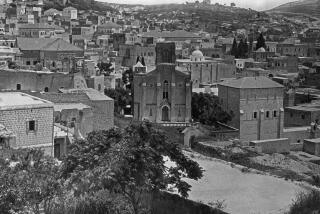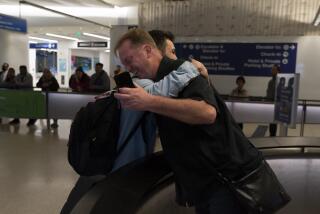From Allied to Alienated
- Share via
Ayatollah Sayed Mortada Al-Qazwini should be one of America’s best friends in Iraq.
A tall, turbaned man with a candid manner and commanding presence, Al-Qazwini was one of the first Shiite Muslim religious scholars to speak out against Saddam Hussein. He lost 15 relatives to Hussein’s brutality, and in 1971 he fled Iraq to escape a death sentence.
He settled in Diamond Bar and built Shiite religious, cultural and educational centers in Pomona, Irvine, San Diego and Detroit over the next 18 years. All the while, he marveled at the freedom he enjoyed to practice the faith of his persecuted sect. After U.S. forces toppled Hussein a year ago, Al-Qazwini was ecstatic and went home to help.
“Ninety-nine percent of the people are so happy that Saddam has been put down. The coalition forces saved us,” he said then.
Now, a year after his emotional homecoming, Al-Qazwini, 75, is deeply disillusioned. U.S. forces have worn out their welcome by failing to fulfill their promises for democracy, political empowerment and reconstruction, the ayatollah said. He wants them to leave Iraq as soon as possible.
Prices have soared, the streets are filled with trash, gasoline lines remain long and blackouts are still common, he said in a recent interview at his son’s home in Rowland Heights.
“The coalition forces are not doing anything about it,” he fumed. “With all their power and authority, they’re staying silent.
“If the U.S. doesn’t improve the situation soon, it’s possible that powerful Shia scholars might tell people to resist,” Al-Qazwini said. “Right now the Shias are choosing to cooperate, but patience has a limit.”
Al-Qazwini represents a window into the heart of Iraqi aspirations -- and mounting frustrations.
His disillusionment developed gradually. In an interview in September, after he had returned from an initial trip to Iraq, Al-Qazwini was still awed by the liberation of his homeland. He was tearful about the miracle that U.S. forces had delivered to him: a chance to set foot again on the sacred soil of Karbala, a southern Iraqi city of more than 1 million people that is home to the holy shrine of Imam Hussein.
For 300 years, his family members had preached and taught in Karbala. During the 20th century, they lived in a home next to the Imam Hussein shrine. During his exile, Al-Qazwini always carried a small cake of Karbala’s holy soil in his pocket. It was a reminder of his heritage and the martyrdom of Imam Hussein, whom Shiites revere.
Karbala was more than a place; it was a spiritual touchstone where Al-Qazwini felt in direct commune with his beloved imam and where he claims to have received healing miracles. So it was no surprise that the moment Saddam Hussein’s regime fell, Al-Qazwini insisted on returning, telling his wary sons that he would buy a rug and sleep in the shrine if need be.
“The first time I saw the dome of Imam Hussein’s shrine, I could not control myself,” he said, his voice cracking and eyes filling with tears. “I began to talk to him: ‘Oh, Imam Hussein, I am your son. I have come from far away to guide my people and country. Please help me.’ ”
Word soon spread that the ayatollah had returned home. Crowds surrounded him, pulling at his clothes, kissing his forehead, demanding to know where he had been, pleading for speeches and sermons.
The people, he said, were hungry for spiritual teachings, which had been severely repressed under Hussein.
For the last year in Karbala, Al-Qazwini said, he has delivered his teachings twice daily -- after noon and sunset prayers -- at the shrine. He started classes on Islamic law and culture, revitalizing a private seminary that had lain dormant during the Hussein years.
According to Al-Qazwini’s son, Moustafa, the family established an orphanage to serve 2,000 children. With friends, the Al-Qazwinis opened a university aimed at giving Shiites the higher education they had often been denied during Hussein’s regime; already, 600 students have enrolled.
They dreamed of bigger ventures. The most urgent was a second hospital for the city. In September, the son said they had begun negotiating with potential donors in the Persian Gulf, grant makers in the U.S. government and Iraqi doctors.
“This is the least we can do to give back to Iraq,” Moustafa said then. “Our horizons have been broadened in America, where we’ve seen so many charities and philanthropic institutions. We thought, why not bring them back to Iraq?”
His father added: “This is what brings people to religion -- not just lectures and sermons and admonishing people to do right. It’s when they see religion serving their basic needs that they become more compassionate in return.”
Six months later, the ayatollah was back in Southern California for a family visit and was recovering from heart bypass surgery. But it was not his health that made him downcast.
His ebullience seemed gone as he plunged into the litany of grievances he had heard from his congregants in Karbala: escalating crime, massive unemployment, disrespectful treatment by U.S. forces.
Chaos has derailed the hospital plans, because security could not be guaranteed for potential donors and doctors. It has also discouraged many Iraqi Americans, an important source of money and expertise, from returning.
“Dreams have been shattered, unfortunately,” said Moustafa, 42, who often acts as his father’s spokesman. “Nothing has been improved. Nothing! Yet we hear of Halliburton receiving multimillion-dollar contracts and we wonder where the money is going. The mistrust of Iraqis toward Americans is evolving and increasing.”
American promises of democracy also have fallen short, the ayatollah said. He said the U.S. position against an Iraqi constitution based on the Islamic law of Sharia “angered and insulted” many Iraqis.
The ayatollah supports a middle course between an Iranian-style theocracy and the U.S. model of separation of church and state. He believes that religious scholars should not hold office but should offer guidance to policymakers. He also believes that the nation’s laws, if not based solely on Sharia, must not conflict with it.
“The majority of people want a government that conforms with Islam,” Al-Qazwini said.
Provisions in the interim constitution that in effect would allow minority groups to veto laws favored by the Shiite majority would again deprive Shiites of their rightful leadership role, the Al-Qazwinis said. Iraqis must be allowed direct elections and the freedom to install the first Shiite government in the Arab world, despite the misgivings of neighboring Sunni Muslim countries, they said.
Some Iraqi Americans remain more positive about America’s effect on their country. But asked whether the Iraqi people are happier today than before the war, the ayatollah replied, “No.”
“The fear of religious persecution has been lifted,” he said, “but people feel they are still unsafe and at any time their lives can be taken away.
“The U.S. needs to realize that they shouldn’t take the Shiite majority for granted,” he said. “It’s within their power to put up resistance if they want.”
Al-Qazwini speaks from family experience. His father participated in the 1920 revolt against the British occupation that was largely led by Shiites from Karbala and Najaf.
By the time he was 30, Sayed Mortada Al-Qazwini already was quarrelling with Iraq’s secular leaders, opposing the communist alliances of Iraqi ruler Abdel Karim Qasim, an army officer who gained power in 1958.
In one exchange, Al-Qazwini said, he got into a heated argument with Qasim over a new law giving equal inheritance rights to women and men. The law violated Islamic tenets that give men twice as much, in keeping with their legal responsibility to provide for women, the ayatollah argued.
When Qasim tried to placate him with offers of financial support, Al-Qazwini said, he stormed out, headed to the mosque and told the crowd that the Iraqi ruler had just tried to bribe him. He was arrested a few days later.
It would be the first of several arrests. There would be two years of exile -- in Zaho, a Kurdish region near the Turkish border, and Tikrit, Saddam Hussein’s Sunni stronghold. Undaunted, Al-Qazwini directed his criticism at Hussein after the Baath Party took control in 1968 and continued to persecute Shiites.
By then, Al-Qazwini had become an ayatollah, Arabic for “sign of God,” with authority to issue religious rulings, establish seminaries, teach and lecture.
The Shiite sect bestows the office on religious scholars who have taught -- often for 15 to 20 years -- and have been certified as competent by a grand ayatollah. Al-Qazwini is one of about 200 ayatollahs in the Shiite Muslim world today. His followers are mainly in Karbala, the Persian Gulf states and the United States.
In 1971, Al-Qazwini said, he was tipped off by the governor of Karbala that Hussein’s forces planned to arrest and execute him. That night, the ayatollah told his family that they were going on a vacation. Only after leaving the country did he explain the real reason for the flight.
He continued to rail against Hussein. In 1980, when the family was living in Kuwait, the Iraqi dictator arrested Al-Qazwini’s father in Karbala. Al-Qazwini says Hussein also sent assassins after him; they shot and missed. The next day, Al-Qazwini fled to Iran. Later he moved to London and in 1986 decided to make the United States his home.
It was here that Al-Qazwini found the freedom he had long dreamed of. At his urging, four of his nine children have followed his lead and started Shiite mosques.
Ali directs the Assidiq Foundation in Pomona, Moustafa heads the Irvine-based Islamic Educational Center of Orange County, Muhammad runs a mosque in San Diego and Hassan directs a center in Detroit. The sons are also active in American Muslim affairs, a new Shiite national organization and numerous interfaith groups.
“My father would often say, ‘In this country, we were able to establish schools and convey the message of Islam and Shiism, even to non-Muslims, whereas in Muslim countries we were not able to do that,’ ” Ali said. “He was so happy.”
Another son, Jafar, said a 1991 incident deepened his father’s emotional connection to America. He arrived at Los Angeles International Airport from a visit to the Mideast, and an immigration officer asked where he had been.
The ayatollah said, “I was home.”
“This is your home,” the officer replied.
“Excuse me?” the ayatollah said.
“This is your home,” the officer repeated.
When he picked up his father at the airport, Jafar said, the ayatollah was in tears.
“After living in exile, moving from one country to another for fear of assassination, to hear someone in America tell him that this was his home deeply touched him,” Jafar said.
It pains the ayatollah now to see such hostility toward the U.S. forces that once symbolized freedom.
“In those first days, everyone was overwhelmed with celebration and joy,” Al-Qazwini said. “But one incident after another took the hope away.”
More to Read
Sign up for Essential California
The most important California stories and recommendations in your inbox every morning.
You may occasionally receive promotional content from the Los Angeles Times.














